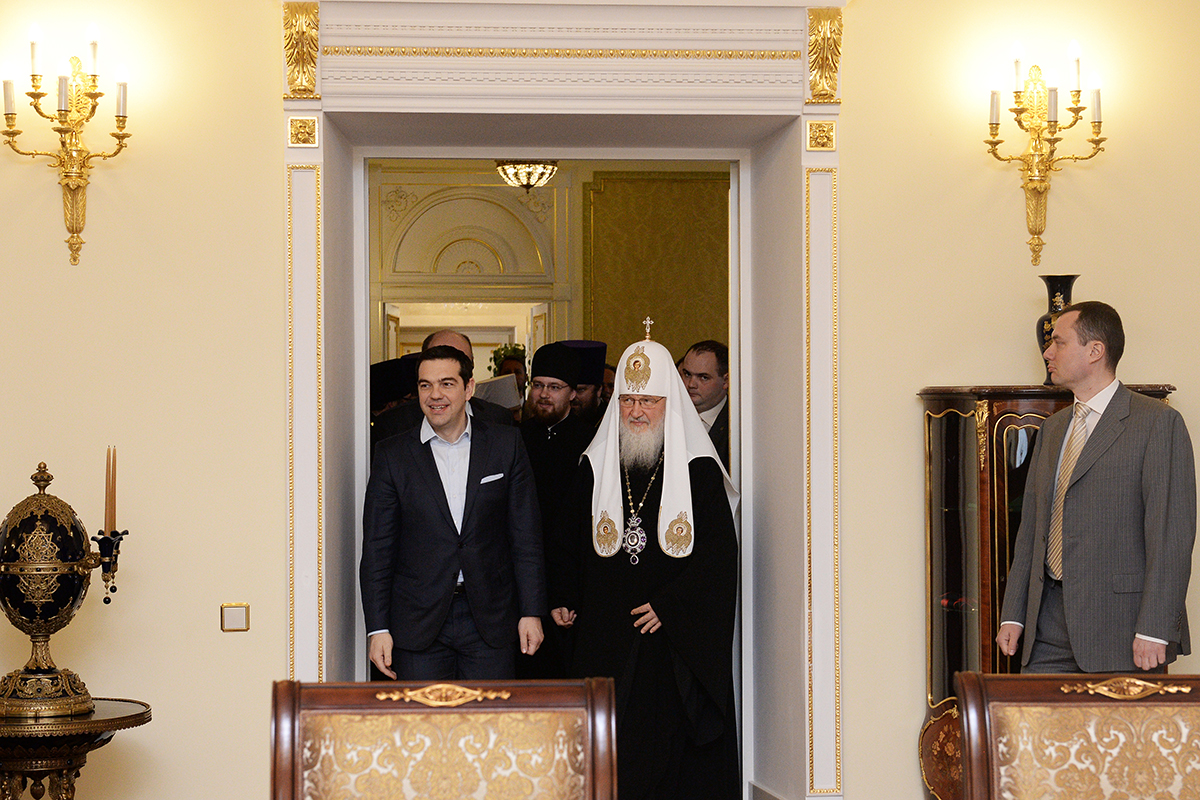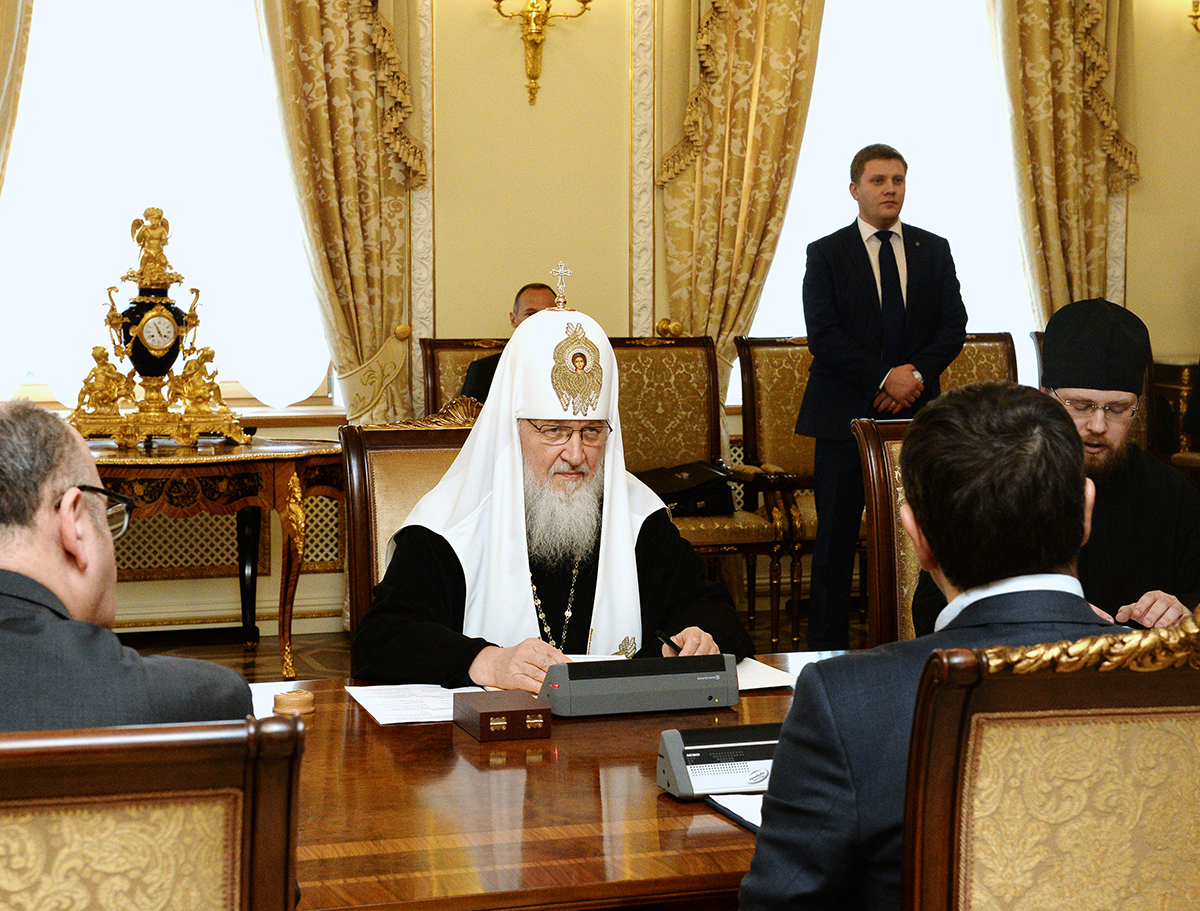Patriarch Kirill meets with Greece’s Prime Minister Alexis Tsipras






April 9, 2015 – His Holiness Patriarch Kirill of Moscow and All Russia met with Geek Prime Minister Alexis Tsipras at the patriarchal and synodal residence in St. Daniel’s Monastery.
The prime minister’s party included Foreign Minister Nikolaos Kodzias, Minister of Production Organization, Environment and Energy Panayiotis Lafazanis, Deputy Finance Minister Nadia Valavani, Greek Ambassador to Russia Danai-Magdalini Koumanakou, and other officials.
Participating in the meeting were also Metropolitan Hilarion of Volokolamsk, chairman of the Moscow Patriarchate’s department for external church relations (DECR), Archpriest Nikolay Balashov, DECR vice-chairman and Archpriest Sergiy Zvonarev, DECR secretary for far-abroad countries.
Welcoming the Greek prime minister, Patriarch Kirill congratulated him on his victory in the elections. ‘You have received a great popular support and together with it an expression of hope for a positive change in the life of the Greek people. You have entered politics early as a person of daring convictions and remained faithful to the choice you made in the beginning of your political career. Many people in Greece support this choice’, he said.
Speaking about the Church’s attitude to politics, Patriarch Kirill noted that ‘if at some moment the Church takes this or that political side, it will cease to be the Church for all the people. I am saying this not from theory but from our historical experience. The Russian Orthodox Church has covered a difficult path, building its relations with the power whose political convictions varied with time. If the Church remains faithful to the Gospel’s principles, then by its nature it is open to possible cooperation with any political force, except extremist’.
Some ideas, such as left-wing political beliefs, are important for the Church as well, he said. ‘In the first place, it is the idea of social justice. If the Church stops insisting on the need for social justice, it deviates from its very important principles. In the Christian outlook, it is not a political but rather ethical idea’.
On the other hand, he said, historical experience has shown that it is impossible to achieve social justice through political or economic means alone. ‘In the Soviet Union, much was done to establish social justice. All the might of the superpower – its economy, policy, science, arts, sports – aimed to achieve this goal. But it failed. Why? Because a very important factor without which it is impossible to achieve social justice was ignored. It is the moral, spiritual basis of the human personality. This mistake made by my Motherland must not be repeated’.
The struggle for social justice should not be accompanied by the destruction of spiritual and moral foundations of people’s life. ‘I very much hope that you and your government will do all that is possible for the benefit of the Greek people, developing the idea of social justice and preserving the spiritual and moral foundations of the life of your people’.
Russia and Greece, His Holiness said, are tied by special bonds as most of the Greeks and most of the Russians belong to the Orthodox Church. ‘This spiritual dimension common to the Greek and the Russians cannot be ignored by any statesman’.
Russians sincerely empathize with the Greek people in connection with the grave economic situation in the country. ‘With your entry on the duty of prime minister, the Greeks hope for a consistent development of the social sphere within a new economic strategy. From our point of view, a socially-oriented policy is fully justified when the state sets itself as its primary goal the service of the people and their prosperity.
The development in the Greek economy is directly linked with the global economic crisis. Along with various material factors, there is a serious moral problem underlying this crisis, His Holiness said. ‘The excessive thirst for enrichment by any means, pursuit of material wealth, making money ‘from the air’… - such an economy may be effective only for a short period of time and this for a certain group of people. It is doomed to crises’.
Discussing the economic sanction imposed on Russia, Patriarch Kirill said, ‘Every cloud has a silver lining. We have to go through this experience in order to realize the need to rely on our own resources’. But in principle, he said, these sanctions are unfair and unlawful. ‘They only complicate the global economic situation by restricting Russia’s participation in the world economy’. His Holiness welcomed Greece’s stand on the sanctions.
Speaking about relations between the Russian and the Greek Orthodox Churches, Patriarch Kirill stressed the important role of pilgrimages made by Russians to Greece. A special role here belongs to Holy Mount Athos. Next year, it will be the millennium anniversary of the Russian presence on Mount Athos. Patriarch Kirill expressed the hope that the head of the Greek government will take part in the anniversary celebrations.
His Holiness also spoke on the catastrophic situation of Christians in the Middle East. ‘Today, the Christian population is either eliminated or expelled; churches are destroyed. The Middle East may become mono-religious as Christianity is ousted from it. It is already a civilization catastrophe because Christians have always lived in the Middle East, and the disappearance of the Christian population will have very dangerous, including political, consequences’, he stressed.
Mr. Tsipras, on his part, noted that Christian values are also important, among others, for people with left-wing political beliefs. ‘We are walking parallel paths and communicate on many value issues in a great common space. At a time when there is a crisis of values developing along with an economic crisis, the spiritual-moral traditions are especially important’, he said.
The Greek prime minister also stressed the importance of the social service carried out by the Russian Orthodox Church. ‘The close relations between our nations are based on common spiritual traditions and common religious beliefs of most people in our countries. We share a common history and a common struggle’, he said.
Mr. Tsipras pointed to pilgrimage as a serious contribution to the development of relations between the two nations. ‘Mount Athos is a serious part of the Greek spiritual heritage. It has a special role in the development of Greek Orthodoxy. But it also belongs to the world spiritual heritage as monks from all parts of the world live in it. He stressed that the preservation of this spiritual and cultural heritage is a priority task for the Greek government.
The Greek government, he said, share the concern for the fate of the Christian population in the Middle East and North Africa. ‘We are ready to support any decision which will help change the situation of Christians in the Middle East’.
DECR Communication Service
Photos by the Patriarchal Press Service
